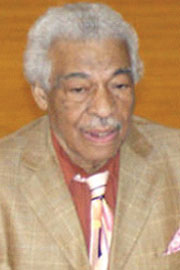
Kansas City, Kansas NBA pioneer passes away at 86
By Sam McDowell, Staff Writer/Kansas City Star
Edited by Victor Trammell/BlackBlueDog.com
A group of alumni from Sumner High School began meeting in 2000 with the intention of writing a book detailing the school’s rich history.
In the 1940s, Sumner High — now known as Sumner Academy — was the only all-Black high school remaining in the state of Kansas. It ranked among the top 10 schools nationally for its science programs. These characteristics would’ve made fine starting points for The Sumner Story, which was released three years ago. But this particular group of alumni knew of a better place to start its work — with 1944 graduate Harold Hunter, who became the first African-American to sign an NBA contract when he dotted the line for the Washington Capitols on April 26, 1950.”He was the first person we wanted to call,” said Chester Ownens, a 1949 graduate of Sumner who heads the alumni group. “Harold had to be in the book.”
A pioneer in professional and college basketball, Hunter died Thursday morning at his home in Hendersonville, Tenn. He was 86.
He never played a game in the NBA — the Capitols cut Hunter during training camp — but he later became the first Black man to coach the U.S. Olympics team and the first African-American coach to help lead both men’s and women’s teams to the NAIA national tournament.
As a 5-9 point guard, Hunter’s talents on the floor — most notably his whirlwind speed — landed him the NBA contract. But his personality later in life is what those who remembered him Friday recalled most.
A security guard at Sumner Academy, Carlener Slaughter played for Hunter from 1980-85 when he was an assistant coach at Dillard University in New Orleans.
Slaughter recalled packing up a few of her dearest items in 1980 and traveling south. She knew virtually no one in New Orleans other than a man to whom she referred as the most inspirational person she had ever met.
“I didn’t have a father, so Coach Hunter was my father figure,” Slaughter said, pausing to collect her emotions. “He was more than a coach to me. He gave everything he had to his players, and that meant everything to me.”
After graduating from Sumner Academy, Hunter attended North Carolina Central. In 1950, he was named the most valuable player of the Central Intercollegiate Athletic Association tournament, which NCC won. He was inducted into the CIAA Hall of Fame in 1987.
After being cut by the Capitols in 1950, Hunter played semi-professionally in the Eastern League for two seasons before spurning an offer from the Harlem Globetrotters in favor of pursuing a coaching career.
He ranks second in all-time coaching victories at Tennessee State, where he went 172-67 from 1959-68 and produced 17 NBA players. He led the men’s team to a third-place finish at the 1960 NAIA national tournament at Municipal Auditorium in Kansas City.
“We are saddened to hear of the passing of Harold Hunter, Sr.,” Tennessee State athletics director Teresa Phillips said in a story posted on the school’s website. “He was among the best and brightest. … A great teacher, coach, mentor and man.”
Hunter later served as an assistant coach for the women’s team at Dillard, which also placed third in the NAIA tournament.
“He was an excellent coach, but he was tough,” said Slaughter, who was a three-year starter at Dillard during Hunter’s tenure as an assistant. “He always talked about fundamentals. We did the basics.
“It was truly an honor to play for him.”
Hunter remained in New Orleans after his coaching career until he and his wife, Jacqueline, who survives him, were displaced by Hurricane Katrina.
